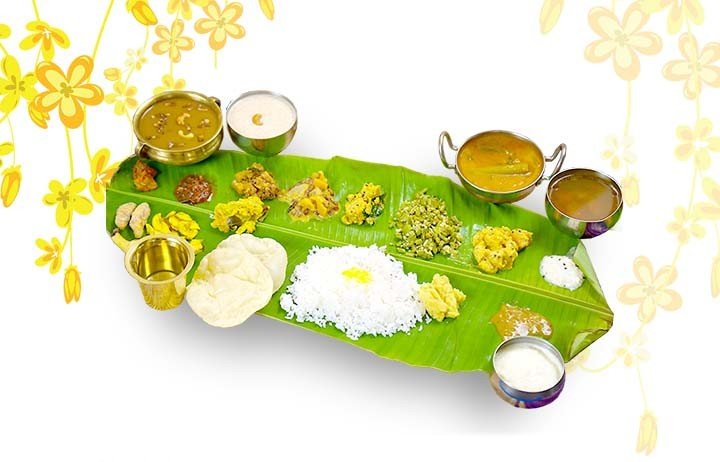
Vishu is a regional Hindu festival celebrated in Kerala. It heralds the beginning of the astrological New Year and the arrival of spring in Kerala. Vishu is also celebrated as a harvest festival for the people of Kerala coinciding with the time of the year when the indigenous crops are ready for harvest.
Vishu is celebrated on the first day of the month Medam in the traditional solar calendar followed in Kerala. Medam 1st is the day on which the Sun re-enters the Medam or Mesa Rasi (Aries) and starts the next cycle. In the Gregorian calendar, the date coincides with April 14 or 15. It is believed that the celebration of this festival started in the year 844 AD. The term Vishu was derived from the Sanskrit-Malayalam word Viṣuvam which means ‘equal’. The celebration of this festival is also related to the spring or vernal equinox on which day and night are equal.
Being the new year, Vishu predictions are immensely popular among the people of Kerala. Clickastro Vishu predictions for the different Zodiac signs are as follows:
Vishu predictions
Aries:
This will be a better season than last year. Financial progress will be achieved. Students can get high marks in the exam. Officers can expect a pay rise.
Taurus:
It is an auspicious time for singles to get married. Expect mixed results. There will be great benefits financially. You can get a new job. There will be opportunities for foreign travel.
Gemini:
The beginning of the year will be good but later on there will be difficulties and unnecessary expenses. Government employees may be transferred to distant places.
Cancer:
Starting new ventures will improve financial status. Those who have been separated will be united. There is also a possibility of getting possession of ancestral property.
Leo:
The second half will be better than the beginning of the year. There is a possibility of increased occupational stress. Other people’s misconceptions about you will change.
Virgo:
This is a year where great fortunes can be expected. All the problems that have been bothering me for a long time will be solved. Health will improve. Financial progress will be achieved.
Libra:
Many things are likely to be hindered. Care should be taken to perform prayers and offerings without ceasing. Problems with relatives will be solved. Be more careful with money transactions.
Scorpio:
In general, it will be a year of divine influence. Many slow things will become fast. Singles will get married. Times are good for new ventures.
Sagittarius:
Although the beginning of the year is good, later things will slow down and there will be financial troubles. Government employees may get a transfer. Expenses for children will increase.
Capricorn:
House construction can be completed. Promotion and financial progress can be expected. New responsibilities will be taken up. A childless couple can expect to be blessed with children.
Aquarius:
This is the year when lots of traveling is required. You can get a new house. There will be peace, and prosperity in the family. The old vehicle will be exchanged for a new one.
Pisces:
The financial situation will improve at the beginning of the year. There will be progress in academic matters and everything, but later things will turn out to be unfavorable. Do not start any new ventures.
Read Vishuphalam in Malayalam
Vishu Celebrations
Vishu is a festival symbolizing agricultural prosperity and fresh hopes for the New Year. The celebration of Vishu is unique following traditional rituals and observations. These include arranging the Vishukkani, offering VishuKaineettam, having VishuSadya, and other enjoyments such as lighting the fireworks. Generally, Lord Krishna is worshipped on this day.
Vishukkani is a display of auspicious items along with freshly harvested rice, vegetables, and fruits in front of an idol or picture of Lord Krishna. People arrange Vishukkani at home and in temples and view this auspicious arrangement at dawn on Vishu day.
VishuKaineettam is the tradition of the family’s elder members giving money to the younger generations and servants. VishuSadya is the traditional Kerala feast (Sadya) with some special Vishu preparations.
The famous temples such as Guruvayur Sree Krishna temple, Sri Padmanabhaswamy temple, Sabarimala Ayyappan temple, and Kulathupuzha Sree Bala Sastha temple in Kerala celebrate Vishu with great aplomb. Devotees throng the temples in the early hours of the day to witness the Vishukkani Kazhcha and view the Vishukkani or the auspicious arrangements made at the temple along with the worship of the deities. Devotees also offer special pujas to Lord Krishna on this day.
Read about Akshaya Trititya
When is Vishu 2024?
Vishu 2024 is on Sunday, April 14.
The important timings of the day are as follows:
Vishu 2024 Timings:
- Sankranti Time: 9:06 PM, April 13, 2024
- Sunrise: 6:18 AM, April 14, 2024
- Sunset: 6:31 PM, April 14, 2024
What is the significance of Vishu?
Agricultural Significance of Vishu:
Vishu coincides with that time of the year when the indigenous crops are ready for harvest. It marks the movement of the Sun to Aries or the Mesha Rashi, which the farmers consider the right time to begin plowing the land. Vishu, thus, celebrates agricultural affluence. The most important Vishu custom of Vishukkani is the display of freshly harvested agricultural products, including mangoes, jackfruit, cucumbers, etc., along with other auspicious materials.
According to the traditional Kerala Calendar, Vishu is observed on Medam 1st and the Pathamudhayam occurs on Medam 10th. Pathamudhayam is an important day for farmers who consider it the ideal time for sowing seeds. It is the tenth day of the month Medam, and the term Pathamudhayam means ‘tenth sunrise’. Traditionally, this day is celebrated by selling and exchanging agricultural products. To symbolize the ten sunrises starting from Vishu, traditional oil lamps with ten wicks are lit in houses on this day.
Astrological Significance of Vishu
Vishu is an astrologically important occasion. Though the official Malayalam New Year is the first day of the month Chingam, it doesn’t have any astrological significance. As per the Indian astrological calculations, it is Vishu that marks the astrological New Year of Kerala. It signifies the Sun’s transit into the first rasi Medam or Aries. It was also associated with the spring or vernal equinox in the past, the occasion on which day and night have equal durations. The Sun entering into Medam or Aries was used as a way of observing the equinox. Even the term Vishu was coined from ‘Visuvam’ meaning equal day and night. Gradually, due to the wobble of the earth, the vernal equinox got shifted to 24 days before the Vishu, on the 7th day of the month Meenam.
Pathamudhayam, which follows Vishu, is observed on the 10th day of Medam month. Astrologically, the Sun will be at ten degrees in the sign of Medam or Aries on this day. The traditional belief is that the Sun is most powerful on this day, and astrology supports this notion.
Mythological Significance of Vishu:
There are a few mythological tales associated with the celebration of Vishu. One such story is that Lord Krishna killed the demon Narakasura on this day. This is one reason for worshipping Lord Krishna on Vishu day.
Another mythological tale is associated with Surya Dev (Sun God) and the demon king Ravana. Once, Ravana prevented Surya Dev from rising from the east and it was only after the defeat of Ravana, that Surya Dev could resume rising from the east. Hence, the belief is that Vishu commemorates the return of Surya Dev.
What is Vishukkani?
Vishukkani is the most important ritual of Vishu. The Malayalam word ’Kani’ implies ‘one that is seen first’. So, Vishukkani refers to the first sight at dawn on Vishu. It is believed that one’s future is a function of what one sees or experiences at the beginning. If one begins a day or a year viewing virtuous or auspicious things, then the whole day or year would be prosperous and lucky. Since Vishu marks the beginning of the New Year, it is customary to view the auspicious Vishukkani before sunrise on Vishu.
Vishukkani is a grand display of auspicious items arranged to be viewed as the first sight on the day of Vishu. It includes fresh harvest of agricultural products such as rice, mangoes, jackfruit, coconut, lemon, bananas, areca nut, cucumbers, etc., betel leaves, gold, currency notes or coins, silk cloth, a mirror, a holy Hindu text, and the golden yellow KaniKonna flowers or the golden shower flower (Indian laburnum). Vishukkani is an important feature of Vishu and is arranged in every household by the elderly womenfolk.
The fruits are set in an Uruli, an open-mouthed shallow circular vessel made out of ball metal or brass. All the items described above, along with a Nilavilakku (the traditional bell-shaped oil lamp) are arranged in front of an idol or picture of Lord Krishna. The Vishukkaniis are considered to be incomplete without a bunch of KaniKonna flowers or Konnappoo as it is locally known. These are bright yellow flowers, which usually bloom at the time of Vishu.
Vishukkani is arranged in the evening before Vishu. On Vishupulari (the dawn of Vishu day), the elderly lady of the home would wake up early and light the Nilavilakku arranged in the Vishukkani. Then, the other members of the house are woken up by the lady and guided to the place where the Vishukkani is set, with closed eyes. The family members would only open their eyes in front of the Vishukkani to view it as the first sight of the New Year.
The grand visual of Vishukkani with lit-up Nilavilakku in front of the image of Lord Krishna is believed to bring good luck, fortune, and prosperity for the entire year. This custom is called Kanikaanal (viewing the Kani). The mirror arranged in Vishukani is symbolic of viewing oneself as a part of the abundance one sees or experiences.
Some of the households also read the verses from the Ramayana or Bhagavad Gita after viewing the Vishukkani. It is also believed that the page which is opened would have some relation to the person’s life in the coming year.
Vishu Sadhya
Sadhya is the traditional Kerala meal served on special occasions. Keralites prepare Sadhya or the traditional feast on important occasions such as Onam, Vishu, etc. Apart from the usual dishes for Sadhya, special items are also prepared on Vishu using the harvested jackfruits, mangoes, pumpkins, and other seasonal vegetables and fruits. Vishu Kanji (Vishu porridge) and Thoran, VishuKatta, Veppampoorasam, Mampazhapulissery, Mampazhapachadi, Chakkaerissery, Vishupuzhukku, etc. are some of such special dishes prepared on Vishu.

Vishu Kanji is a preparation using rice, coconut milk, and spices. There are some mandatory ingredients for the side dish Thoran also. Vishu Katta is a delicacy prepared using freshly harvested rice powder and coconut milk served with jaggery. Veppampoorasam is a bitter preparation of neem and Mampazhappulissery is a kind of sweet and sour mango curry prepared in coconut and curd.
The preparations such as Mampazhapachadi, Chakkaerissery, Vishupuzukku, etc. provide a mix of sweet, sour, salty, and bitter tastes. Such traditional festive recipes combining different flavors are a symbolic reminder that one should expect all flavors of experiences in the coming New Year.
Other customs of Vishu
VishuKaineettam is another important tradition of elders gifting money to younger ones and dependents of the family. The other popular traditions include buying Puthukodi or new clothes, setting off fireworks, and arranging processions in which groups of people move from house to house and collect rewards for their performances.
Regional Variations of Vishu
Vishu marks the New Year in the traditional solar calendar. It is celebrated in Kerala, the Tulu Nadu region in Karnataka, the Mahe district of the Union Territory of Pondicherry, and some areas of Tamil Nadu. In the Tulu region, this festival is called Bisu. This same day is celebrated as New Year in other regions of India that follow the solar calendar. Thus, the people of Punjab and Haryana celebrate Baisakhi, Tamil Nadu celebrates Puthandu, Assam celebrates Bihu, West Bengal celebrates NabaBarsha and Orissa celebrates Pana Sankranti.
Vishu Festival dates from 2024 to 2026
| Year | Date | Day |
| 2024 | 14th April | Sunday |
| 2025 | 14th April | Monday |
| 2026 | 15th April | Wednesday |
Discover more from reviewer4you.com
Subscribe to get the latest posts to your email.







